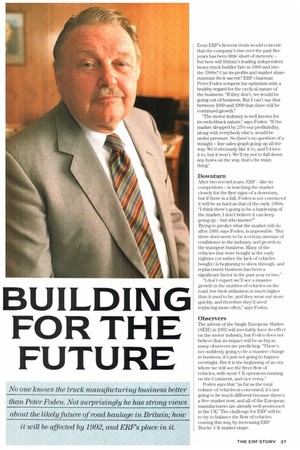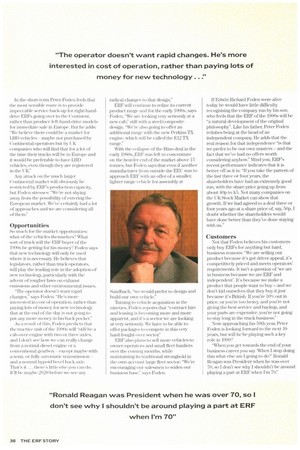BUILDING FOR THE FUTURE
Page 193

Page 194

If you've noticed an error in this article please click here to report it so we can fix it.
No one knows the truck manufacturing business better than Peter Foden. Not surprisingly he has strong views about the likely future of mad haulage in Britain; how it will be affected by 1992, and ERF's place in it.
Even ERF's fiercest rivals would concede that the company's rise over the past five years has been little short. of meteoric but how will Britain's leading independent heavy truck builder fare in 1989 and into the 1990s? Can its profits and market share maintain their ascent? ERF chairman Peter Foden tempers his optimism with a healthy regard for the cyclical nature of the business: "If they don't, we would be going out of business. But I can't say that between 1989 and 1999 that there will be continued growth?'
The motor industry is well known for its switchback nature," says Foden. "If the market dropped by 25% our pnofitability, along with everybody else's, would be under pressure. So there's no question of a straight line sales graph going up all the way. We'd obviously like it to, and I'd love it to, but it won't We'll try not to fall down any holes on the way, that's the main thing:'
Downturn
After two record years, ERF like its competitors is watching the market closely for the first signs of a downturn, but if there is a fall, Foden is not convinced it will be as hard as that of the early 1980s: "1 think there's going to be a hardening of the market. I don't believe it can keep going up hut who knows?"
'flying to predict what the market will do after 1989, says Foden, is impossible. "But there does seem to be a certain amount of confidence in the industry, and growth in the transport business. Many of the vehicles that were bought in the early eighties (or rather the lack of vehicles bought) is beginning to show through, and replacement business has been a significant factor in the past year or two."
"I don't expect we'll see a massive growth in the number of vehicles on the road, but their utilisation is much higher than it used to he, and they wear out more quickly, and therefore they'll need replacing more often," says Foden.
Observers
The advent of the Single European Market (SEM) in 1992 will inevitably have its effect on the motor industry, but Foden does not believe that its impact will be as big as many observers are predicting: "There's not suddenly going to be a massive change in business, it's just not going to happen overnight. But it is the beginning of an era where we will see the freer flow of vehicles, with more UK operators running on the Continent, and vice versa."
Foden says that "as far as the total volume of vehicles is concerned, it's not going to be much different because there's a free market now, and all of the European manufacturers are already well-positioned in the UK:' The challenge for ERF will be to try to balance the flow of vehicles coming this way, by increasing ERF 'frucks' IJK market share. In the Anon-term Peter Ft Mien feels that the most scnsible none is to pn ovide impeccatote service back-up for
drive El?P's going ipwr to the Continent, rather than pro( fury kin-hand-illiVii 1114 idelS For 1d1111011;de sale in Europe. Boa he adds: -We lolly)). tho ire could be it 111itr1:(•1 fin. II II) vehicles mayiai not purchased by Continental r operators but by I K companies who will lind that for a kit of the time their I nicks will be in Eurrope and it mould be preferable to have LHI.) vehicles, even though they are registered in the 1 7K."
Ally attack rot the much larger C( nil Mental marlott will I obviously be nisi drip( I by ERF's pnoluction capacity,
but 1i'04 si n•SSCS: 11111 shying away from the possibility (if entering the Eun Teat) market. We've certainly had a lot (of apprcoaches and we are considering all (it them."
Opportunities So much 145 111e litarkei opportunities: what of the vehicles themselves? What son of I nick will the ERE buyer 1 d" 111e 1490s ht. getting I( or his money? Foote]] says that new let-hut& o..ly will only be timid where it is necessary. He twiieves that legislatrirs, rather that' !nick operators, will play lhe leading role in ilw adoption of new tecluology, particularly with the advent of tougher laws on exhaust emissions and tither emir( nunental issues.
"Theii oirator doesn't wam rapi(I changes." says Foden. "He's rdi
interested in crost of operation. rather than paying has of money low new let-Mork ogxI hal al the end of the day is not go Ong to put any mon. moi ley in his back to a.krit."
As ti-still of this. Foden predicts that 11w 1 tact ive unit of the Ito Ii s vo ill "still he a tali-1 over-engine with two o or three aN les, ;111(1 I 1100 See 111)W WI call really change from a normal diesel engine o or a conventional geniis ox except maybe with a semi, or fully-automat it ransmission and a normal hypoid bevel back axle. That's it ... here's Mlle else you can do. ICU lie maybe 21120 lick ire we see any
rat heal changes to that design."
ERF will cot inue Ito refute its current pnoluct range :.turl for the early 1000s. says Forkool, "Wi are kol oking very sent oisly at a
mow sl ill with a steel/composite design. "We're alsro piing I() offer an hI k lit ii )nai range with the new Perldns TX engine, Mach a ill be called the E12 TX lunge."
With the collapse of the Hino deal in the early 1080s, rERF was left to concentrate on the heavier end of the market above 15 tonnes, but P( ode!' says that even if am other manufacturer from outside the EEC was to approach ERE with an r lifer of a smaller lighter range vehicle for assembly at Sandbach. -we would prefer to design and I mild our own vehicle:.
Minting ho vel tide acquisition in the nil et Ms, Rider! repIlliS I htil "contrail' hire and leasing is becoming more and more apparent, and its a sector we are looking at very seriously. We have to be able to offer packages lo compete iii this vtir,v hard-fought-(POir sector."
ERE als41 Oaf IS 14) Sell fflOre vehicles to ri,V114,r-operat ors and small fleet hallherS ■ iver Ow et lulling 'months, while maintaining 11s In-L(111h mud stronghold in the r own-acc( runt large fleet sector: "We're rincouraging 01.11. S:ales111e11 10 Wide]) 41111 1111SineSS haSe: Says; FoIle11.
If Edwin Richard Foden were alive today lw would have little difficulty recognising the company run by his son, who feels that the ERF of the 1090s will be "a natural development of the original philosophy". Like his father, Peter Foden relishes being at the head of an independent comprmy. Ile adds that the real reason for that independence Is that we prefer to be our own masters— anti the fact that we've had no offers worth considering anylam." Mind you, ERF's recent performance indicates that it is better off is: "If you take the pattern of the last three or four years, the shareholders have had an extremely good run, with the share price going up from about Mlp to .S.5. Not many comp:trues on the t 71( Stock Market can show that growth. If we had agreed to a deal three or four yews ago at a share price of, say, 50p, I doubt whether the shareholders would have done better than they've done staying with us."
Customers Not that Foden believes his customers only buy ERFs for anything but hard, business reasons: "We are selling our product because its got driver appeal, it's c( impel itivtily priced and meets operators' requirements. It isn't a question of 'we are in business because we are ERF and independent'. It's because we make a product that people want to buy — and we don't kid ourselves that they buy it just because it's British. If you're 10% out in wive, or you're too heavy, and you're not giving the best service and backup, and your parts are expensive, you're not going to stay long in the truck business:.
Now approaching his 59th year, Peter Foden is lookiiig II award too the next 1() years, hut will he lie playing stick a key role in 1,999?
"Mien you get towards the end of your business career you say 'When I stop doing this what else am I going to do? Ronald Zliagan WiLS President when he was over DI, so I don't see why I shouldn't be around I laying a part at ERF when I'm 70."




































































































































































































